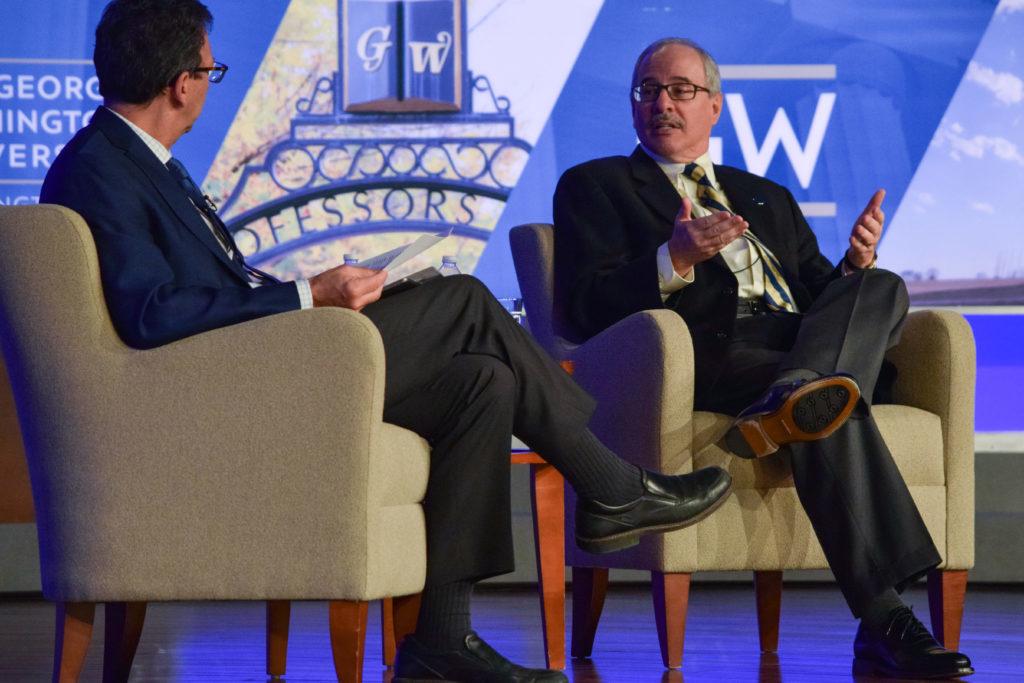Fresh off his inauguration, University President Thomas LeBlanc held a town hall in Jack Morton Auditorium Tuesday fielding questions from students and alumni about major University issues like college affordability and the student experience.
The town hall, which was streamed live on the University’s website, was one of the final events of GW’s three-day celebration of LeBlanc’s inauguration. Officials said the conversation was designed to include alumni in the inaugural festivities.
Students and alumni watching online or in person were able to submit questions for the event.
LeBlanc was asked about many of the topics like research and the University’s global reputation. Both were themes of his inaugural address Monday.
Frank Sesno, the director of the School of Media and Public Affairs, hosted the town hall. Alumni Association President Venessa Marie Perry introduced LeBLanc.
Here are three main takeaways from the event:
Building community
LeBlanc said the amount of opportunities available in the District greatly benefits GW, but also pulls students off campus and makes it more difficult to build a community. He said the University should take action to encourage student friendships and create stronger connections to the campus community.
“We need more spaces where students can gather and engage in community building,” he said.
LeBlanc cited small actions like adding furniture to the porch area outside Duques Hall as a way to build community and increase student interaction. He said Thurston and Mitchell halls, both majority freshmen residence halls, do not have sufficient community spaces for new students to gather.
He added that alumni also play a role in building a stronger community. LeBlanc said he wanted to increase alumni engagement with the University and boost GW’s 9 percent alumni giving rate, which has traditionally lagged behind peer schools.
“Philanthropic support particularly for private Universities will define which universities are going to be great in the future,” he said.
Increasing student diversity
LeBlanc said the large number of student groups and multicultural organizations are not only signs of the University’s diversity, but also provide communities where multicultural students can connect with peers from similar backgrounds.
“Too often in higher education, we check the boxes on diversity but not on inclusion,” he said.
He said the University will continue to make recruiting international students, a major focus over the last several years, a University-wide goal. LeBlanc said that in the current political climate, international students may feel discouraged from studying in the U.S.
Responding to a question about faculty diversity, LeBlanc said faculty search committees need to be diverse to locate strong candidates from different backgrounds.
Officials have sought to increase faculty diversity over the last several years, but recently the effort has stagnated.
The future of GW
One viewer, submitting a question though Facebook, asked LeBlanc about recent budget cuts that have targeted departments like music and women’s studies over the last couple of years amid a rising focus on fields like science, engineering and mathematics.
LeBlanc said budget cuts had improved the University’s financial footing and mostly affected administrative offices and not academic departments. He said he had no intention of minimizing GW’s offerings in the social sciences, but defended the focus on STEM fields.
“Research universities need a strong footprint in science and engineering in the 21st century,” LeBlanc said.
LeBlanc, who began his academic career as a computer scientist, said cybersecurity is going to be a major field of learning and the University will have to choose which areas GW should continue to pursue.
LeBlanc added that although online learning programs continue to grow in popularity, he still believes in the residential college experience and that the roughly $70,000 per year cost of a GW education is worth it because it is an investment in a student’s future.
The discussion later turned to the current challenging political environment. LeBlanc said higher education should be non-partisan and GW could be a place to bridge political divides and debate in a meaningful way. He said questioning scientific fact concerned him and that scientists and engineers have to be in the room to advocate for facts.
“One of the problems is everything is politicized,” he said. “We put on our politics before we put on our reasoning.”





